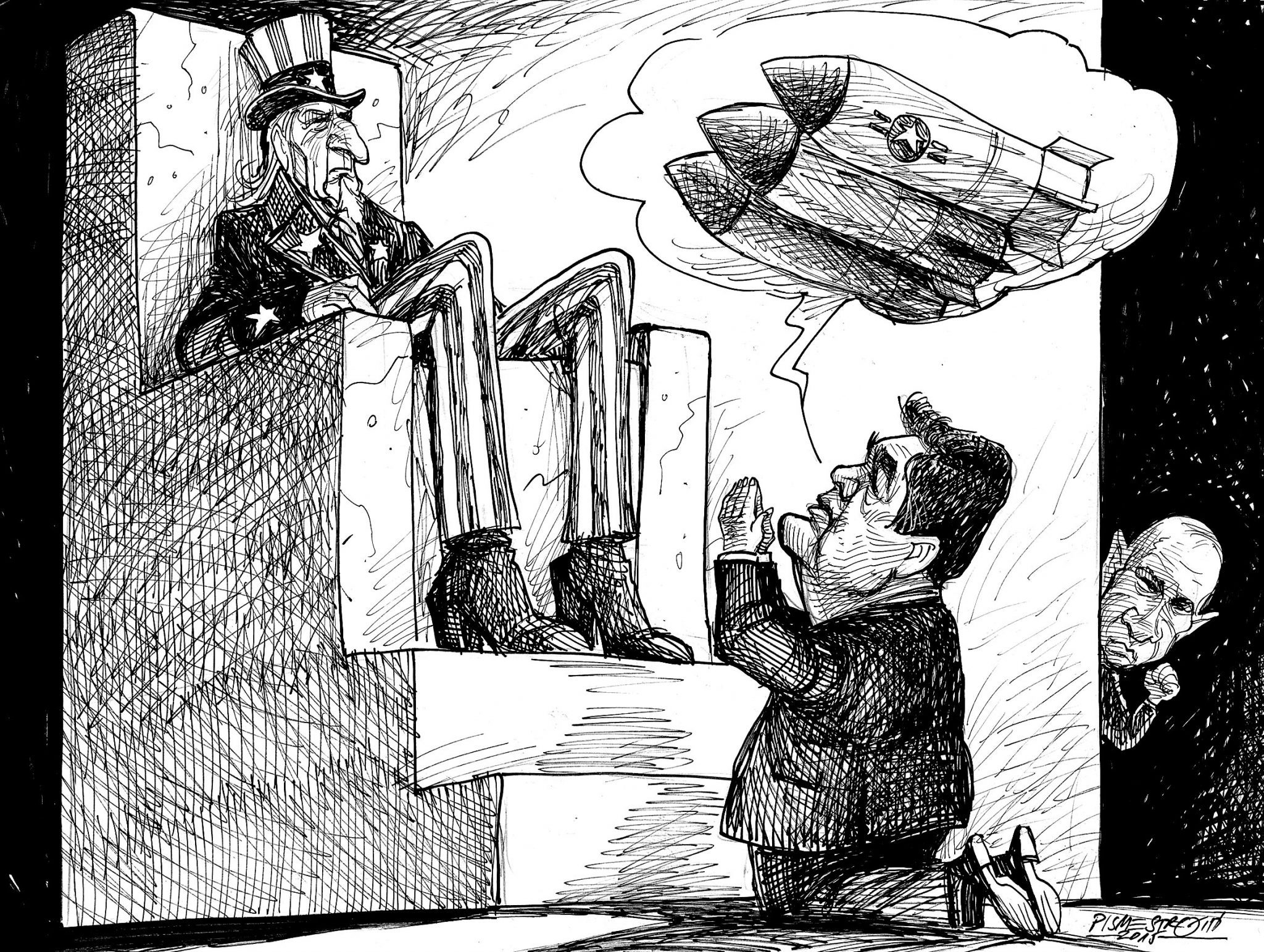BY JEREMY KUZMAROV
 Oklahoma’s Congressional delegation is adamantly opposed to Big Government – except when it comes to subsidizing Big Oil and expanding U.S. military operations.
Oklahoma’s Congressional delegation is adamantly opposed to Big Government – except when it comes to subsidizing Big Oil and expanding U.S. military operations.
Their latest cause is championing the arming of Ukraine.
This past month, 250 soldiers with the 1st Battalion, 279th Infantry Regiment, 45th Infantry Brigade Combat team arrived back in Broken Arrow after a stint training two battalions of the Ukrainian army. Sen. James Inhofe subsequently drafted a letter to President Donald Trump urging him to send “defensive” military weaponry including surplus guns and ground vehicles to Ukraine.
Inhofe acknowledged that the term “defensive” was “insincere because anything you send over can be a defensive weapon.” In his view, however, “Russia’s continued aggression and repeated refusal to respect Ukraine’s territorial integrity warrants a strong response from those of us who respect the rules-based international order.”
Inhofe’s moralizing is undercut by the very fact that Oklahoma’s troops were training battalions in Ukraine which is as much a violation of Ukraine’s territorial integrity as Russia’s.
Inhofe’s outrage about Russia’s alleged disrespect for “a rules based international order” is furthermore laughable if we consider his support for preemptive war and interrogation methods that violate the Geneva Conventions and his contempt for international treaties.
Oklahoma Sen. James Lankford’s office has also issued a statement supporting sending body armor, radios and other weapons to Ukraine to help it “defend itself from Russian occupation.” According to Lankford, U.S. “efforts in Ukraine” are vital to the “defense of Eastern Europe” and “security of the entire region.”
Many Ukrainians, however, do not view the current Poroshenko government in Ukraine as legitimate nor the Russians as occupiers. Poroshenko came to power in what he acknowledged was a coup d’état in February 2014, heavily supported by the United States and West. His government forged alliance with neo-Nazi groups who supported the overthrow of pro-Russian President Viktor Yanukovych.
These groups have been implicated with the Ukrainian army in human rights abuses, fighting separatists in the Eastern Donbass including the shelling of villages, extra-judicial killing and torture in secret prisons.
The western media almost uniformly branded Russia as an aggressor in the Ukrainian war. However, from the Russian point of view, the existence of a neo-Nazi backed government on its border backed by the West, and which came to power illegitimately, is alarming.
Russia’s troop presence has been relatively limited, furthermore, and the separatist rebels in Eastern Donbass are a popular force – locals welcome Russian intervention.
Ukraine has long been divided between East and West, with different segments of the population seeing benefit in allying either with Russia or the West.
The question Americans should be asking is whether it is our duty to pick sides in a complex civil conflict and what underlying agendas have been driving U.S. interference in Ukraine.
Since the late 1990s, the United States has been expanding the North Atlantic Treaty Organization [NATO] into countries bordering Russia in violation of a promise made by former Secretary of State James Baker to Soviet leader Mikhail Gorbachev that the U.S. would not expand NATO to the East if Russia agreed to a unified Germany.
After the fall of communism, American financial interests benefited from rapid privatization policies initiated by Russian President Boris Yeltsin at the behest of his Harvard University advisers.
Yeltsin’s successor, Vladimir Putin, has asserted national control over Russia’s Central Bank and economy and improved conditions from Yeltsin’s time.
The U.S. and EU intervention in Ukraine can be seen in perspective as part of a policy designed to weaken, discredit and potentially destabilize a newly assertive Russia.
Since 2007, Putin has advanced a vision of a multipolar world order and taken steps to consolidate a Eurasian power bloc he hopes one day might rival the United States.
Putin has also aggressively pursued the building of pipelines in Central Asia and oil exploration. These measures threaten American control over the Eurasian heartland, which foreign policy strategists like the late Zbigniew Brzezinski have long considered crucial to American global dominance.
The hysteria surrounding Russiagate so far has revealed very little information about alleged collusion between Trump Administration officials and the Russians or concrete evidence of Russia’s election hacking.
However, it has helped to fuel anti-Russian sentiment and hysteria in the United States, which the foreign policy establishment is using to garner support for confrontationist policies.
Oklahomans should be attuned to the politicized implications of Russiagate, educate themselves about the facts and oppose Inhofe and Lankford’s efforts to arm Ukraine with lethal “defensive” weaponry, particularly at a time the state is facing a major fiscal crisis.
The arming of Ukraine is part and parcel of a strategy that will contribute to more human rights violations by Ukraine’s army and inevitably deepen the geopolitical rivalry between the United States and Russia, fueling a dangerous new arms race and Cold War.
– Jeremy Kuzmarov is J.P. Walker assistant professor of history at the University of Tulsa and author of Modernizing Repression: Police Training and Nation Building in the American Century [Massachusetts, 2012] along with the forthcoming book The Russians are Coming Again: The First Cold War as Tragedy, the Second as Farce [New York: Monthly Review Press, 2018].








